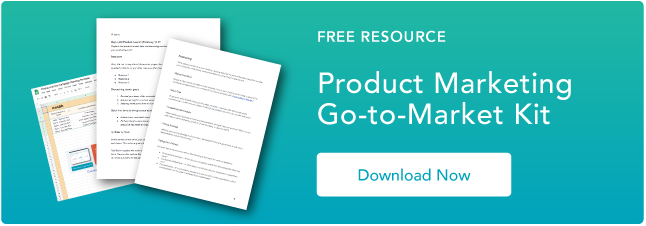Product managers can transform the landscape of consumer research and product creation, having a hand in the formation of some of the most popular software, consumer products, and apps.
But with a field as broad as product management, business professionals need to take time to understand the role, in order to follow this highly lucrative and fulfilling career path.
What Is a Product Manager?
A product manager oversees the step-by-step process of designing, developing, launching, and improving products. They manage products from their conception to long after their launch, including customer research and adding new features.
Product managers work across all industries and in companies of all sizes, from the biggest global corporations to budding startups.
→ Download Now: Free Product Marketing Kit [Free Templates]
What Does a Product Manager Do?
Product managers perform multiple tasks depending on their role, company, and industry. In general, product managers perform functions that enable the creation, experimentation, and launch of new products.
Conducting Customer and Market Research
Product managers identify opportunities by learning about customer pain points, often through customer and market research. They use research to validate ideas, learn more about potential buyers, and understand brand perception.
Collecting primary research through focus groups or surveys, and conducting secondary research — leveraging sources such as government statistics and research agencies — are often duties of a product manager.

Free Product Go-to-Market Kit
Free templates to ensure that your whole team is aligned for your next product launch.
- Product Launch Template
- Product Roadmap Template
- Sales Plan Template
- And more!
Download Free
All fields are required.

Problem Positioning
Helen Huang, founder of product management education platform Co.Lab, says a product manager’s most important task revolves around problem positioning.
Using findings from their research, product managers define and characterize the problem their customers face. They then convey the importance of this problem to internal stakeholders.
This process involves taking a large amount of information, including interviews, survey results, and secondary research, and condensing it into a succinct story.
Collaborating and Brainstorming
While product managers oversee the step-by-step process of creating and launching products, many take a more back-seat approach on different parts, such as development and marketing.
Though they offer consultation and advice, product managers do not necessarily build out the product.
As a result, they collaborate with other teams every day. For example, they might hand off their product vision to software engineers for coding, or let their marketing department lead the way on advertising.
Product Road Mapping
Product managers create product road maps, or a document that contains their vision for a product. This plan of action includes milestones, priorities, metrics for success, and anything necessary to get a product finished. A product road map might include:
- Assignments for different departments
- Deadlines to finish tasks
- Product features
But a product road map can contain anything needed for a product, and one company’s road map could look vastly different from another’s. Through road mapping, product managers create timelines, prioritize features, and align different teams on key goals.
Careers in Product Management
Product management has careers for professionals at all levels, regardless of their educational or professional background. They can also work in a variety of industries, from software development to pharmaceuticals to financial products.
Some common titles, in order of seniority, include:
- Associate product manager
- Product manager
- Senior product manager
- Director of product
- Vice president of product
- Chief product officer
Product managers also have many different functions, which can determine the focus of their role, including:
- Technical product managers: Focus on more technical aspects of product management, such as engineering and development
- Growth product managers: Identify growth opportunities, such as acquisition or customer retention
- Marketing product managers: Manage the advertising and promotion of products
How To Become a Product Manager
How To Become a Product Manager
- Learn the Fundamentals of Product Management
- Create Side Projects That Mimic Product Management
- Network With Product Managers
There’s no specific educational or work experience required for product managers, which makes it a more accessible role for people looking to access industries like tech.
Still, product management has emerged as a competitive field — so, consider the following steps to maximize your shot at landing a product manager role.
Learn the Fundamentals of Product Management
Although experience generally matters more than education in product management, you will need to master the foundations before landing a role. This can include how to conduct effective customer research or how to prioritize different product features.
Leverage online resources, such as online or in-person product management courses, to learn the basics. You can also engage in online forums, such as Reddit’s r/ProductManagement, to see what product managers talk about.
Create Side Projects That Mimic Product Management
Huang notes that aspiring product managers can make themselves stand out by mimicking the product management process through side projects. For example, you could start by creating:
- Competitive Analysis: Evaluates a company’s competitors, looking at their advantages, disadvantages, and how they relate to the firm
- Product Vision: Creates a product’s story using narration, a storyboard, and other descriptive techniques
- Product Requirements: Lays out a product’s features and priorities, including metrics for success, minimum viable products (MVPs), software details, and more
- Designs/Prototypes: Visualizes what a prospective product should look like, pointing out different parts of it and how they function together
You could then create a portfolio of your work and feature it on LinkedIn or a personal website, linking it in your job applications.
If you end up identifying a viable market opportunity, you could turn your side hustle into a full-blown startup. Though this takes more time, running a startup mimics core functions of product management — from customer research to product road mapping to launching a product.
Network With Product Managers
Nearly 8 in 10 professionals say their network helped them find work. Try networking with product managers in an industry you hope to enter. By meeting new people, and checking in with them regularly, you can eventually ask them for referrals when a job opens up.
Best practices for networking include:
- Ask specific questions related to the person’s experience, role, or company
- Ask people about themselves
- Send follow-up notes after chatting
- Tell them your intentions, including what you hope to gain from the conversation

Free Product Go-to-Market Kit
Free templates to ensure that your whole team is aligned for your next product launch.
- Product Launch Template
- Product Roadmap Template
- Sales Plan Template
- And more!
Download Free
All fields are required.

Product Manager Requirements
Education
In general, this role requires a bachelor’s degree in a business-related field, such as statistics, economics, and computer science. Though not required, a bachelor’s degree can help you stand out, especially among more competitive entry-level positions.
Experience
Most roles require some level of product management experience. Though entry-level roles (e.g., associate product managers) require less experience, many college graduates with internships compete for these positions.
Working professionals looking to enter the field can easily rework their previous experience through a product management lens. For example, if you ever took on a leadership role, you could explain how you collaborated with others, created a timeline, or set success metrics.
Is an MBA Required To Become a Product Manager?
Some product managers have bachelor’s degrees. Others completed high school and started working immediately. The path to becoming a product manager does not have a cookie-cutter, linear progression.
But some degrees, including an MBA, can help candidates stand out. According to ProductPlan, 45% of product managers have a master’s or doctorate degree.
Product Management Skills
Product management needs a blend of soft and hard skills — some useful soft skills include:
- Communication: Convey complex information, such as customer research and product features, in a clear and compelling way
- Collaboration: Work with multiple departments, such as marketing and engineering, to execute on a product timeline
- Creativity: Brainstorm unique, effective ways to solve customer problems, generate new features, and market products
- Empathy: Understand different perspectives from internal teams and customers
- Strategy: Take a high-level approach to decision making, keeping in mind the long-term impact of your vision and goals
Product managers also need a solid set of hard skills, including:
- Industry-specific expertise: Know the terminologies and jargons used by professionals in your target industry
- Product life-cycle utilization: Create and understand the life cycle of a product, from its inception to post-launch optimization
- Product release management: Manage the release of a new product or features, and convey specific end goals to other stakeholders
- Product design knowledge: Know the best practices when conceptualizing products
- Value proposition creation: Create succinct, clear statements conveying problem definitions and the value of products
How Much Does a Product Manager Make?
With an average pay of ~$77k for entry-level product managers, the profession pays above the national average salary of ~$56k.
For product managers with a few years of experience, they can expect to bring in an average salary of ~$128k. The more technical the role, the higher it pays: Technical product managers make an average pay of ~$155k. These roles do require more specialized knowledge, such as computing languages and software engineering.
Down the line, directors of product currently make an average pay of ~$273k compared to the overall average of ~$219k for directors across industries.











